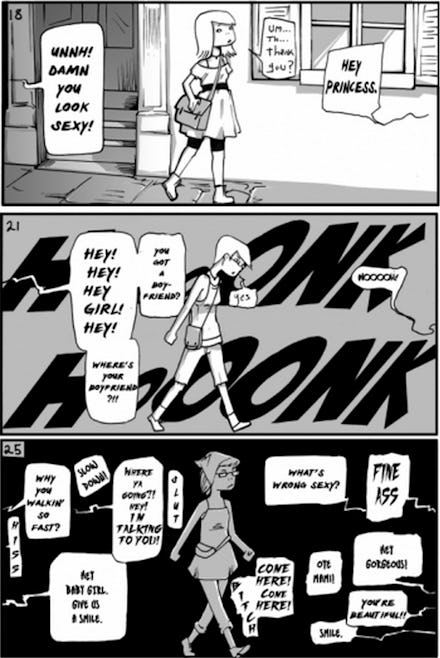One Comic Perfectly Sums Up the Reasons Why Catcalling Is Never a Compliment

When women express their frustration about catcalling and other unwanted street harassment, the most common response from ignorant men is along the lines of "But aren't you flattered? Isn't it a compliment? Why don't you appreciate someone calling you a hottie?"
Women have tried numerous times to explain why catcalling isn't a compliment and why no woman wants to feel as if she's just body parts. Ursa Eyer, a New Orleans-based artist and illustrator, is the latest woman to take on the challenge. Despite what the New York Post's Doree Lewak recently wrote, not all women "live to strut another day," so Eyer has drawn a personal history of her own struggles with catcalling, highlighting the longevity of the problematic trend and how it affects women and girls of all ages.
Eyer told Mic it took some time for her to realize the toll the constant harassment was having on her emotional well-being. "Only after years of being followed for blocks, picked up (off my feet), yelled at, kissed at, hissed at and honked at, did I realize, I wasn't a person to these guys — I was an object," Eyer told Mic. "It was really scary and uncomfortable realization. Now I feel like I'm putting on armor every time I leave my home by myself. I walk a certain way, I don't make eye contact and I definitely don't smile. I know a smile can lead to blocks worth of harassment."
Eyer's comic strip, a series of nine illustrations, shows how unwanted attention from strangers evolves over the years for females. It might start with a seemingly harmless, "she's gunna be a heartbreaker" directed at a 10-year-old to inquiries about boyfriends — because only other men's property is off limits, right? — to sexually suggestive and aggressive comments in adulthood.
"I was motivated to make 'Cat Call' after embarking on yet another frustrating conversation with a man who genuinely wanted to know 'what the big deal was,'" Eyer told Mic. "I feel like I'm looking at the tip of an iceberg and being asked to describe what the mass of ice underneath the water looks like. It takes forever. I wanted to create a visual explanation that would articulate the history and detriment of catcalling better than I could with just words."
The comic strip peaks at age 28, when the woman fights back and decides that enough is enough. Eyer recalls an incident when she herself was pushed over the edge. "I was walking at night, with a girlfriend, down a busy New Orleans street," she said. "I heard two men behind us making comments. I tried to ignore them, but suddenly I saw one of them pretending to touch and slap my friend's butt. Not only were these guys getting into our personal space and making unwelcome comments, but now one of them was trying to be funny by pretending to physically assault one of us. He was inches away and I just started screaming, 'How dare you, you guys are fucking disgusting! Get the fuck away from us.' They seemed shocked for a second, but then laughed and walked off."
The larger problem here is that these experiences, shared by so many women, don't seem to be ending. This is in large part because, as the last strip shows, men who are rejected like this are far too often left asking "What is her problem?" and turning the blame back on the victim of the harassment instead of taking a long look at their own behaviors. Hopefully, Eyers' comic will help change that. As Julianne Ross wrote for Mic earlier this week, "Catcalling's latent creep factor has been overlooked for far too long, but the more attention we pay to its effects, the better shot we have at getting guys to think twice before spurting 'compliments' at women who are just trying to walk down the street in peace."
Image Credit (All): Ursa Eyer